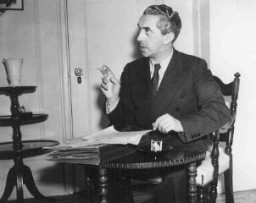You searched for: ���������������������������������������������fuk7778���your
<< Previous | Displaying results 21-30 of 163 for "���������������������������������������������fuk7778���your" | Next >>
-
Joseph Stanley Wardzala describes forced labor in Hannover
Oral HistoryJoseph and his family were Roman Catholics. After Germany invaded Poland in 1939, roundups of Poles for forced labor in Germany began. Joseph escaped arrest twice but the third time, in 1941, he was deported to a forced-labor camp in Hannover, Germany. For over four years he was forced to work on the construction of concrete air raid shelters. Upon liberation by US forces in 1945, the forced-labor camp was transformed into a displaced persons camp. Joseph stayed there until he got a visa to enter the…
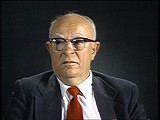
-
Leo Kutner describes forced labor in Stutthof
Oral HistoryLeo was arrested on the first day of the war, and assigned to forced labor in a shipyard, then on a farm. In 1940, like other Jews, he was deported to Stutthof. There, he upholstered furniture for the SS. The following year, he was sent to Auschwitz, where he cleaned the streets and dug ditches. As the Allies neared, Leo was evacuated to a series of camps. On a death march from Flossenbürg, the Nazis dispersed, allowing Leo and other prisoners to get away. He was liberated by US forces in April 1945.
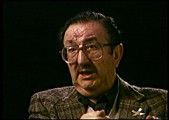
-
Leo Bretholz describes arrival at the Drancy camp
Oral HistoryAfter the Germans annexed Austria in 1938, Leo attempted to flee. He eventually reached Belgium. In 1940 he was deported to the St.-Cyprien camp in France but escaped. In 1942 Leo was smuggled into Switzerland but was arrested and sent back to France, this time to the Rivesaltes and Drancy camps. He and a friend escaped from a train deporting them to Auschwitz in Poland. Leo joined the French underground in 1943. He arrived in the United States in 1947.
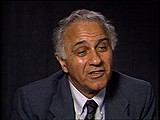
-
Beno Helmer describes conditions in the Lodz ghetto
Oral HistoryAs a young man, Beno used his foreign language skills to land small movie roles. He and his family were deported to the Lodz ghetto, where they struggled daily to find food. In the underground, Beno became an expert at derailing trains. The family was sent to Auschwitz and was separated. All but Beno and one sister, whom he found after the war, died. Beno survived a series of camps and later helped to track war criminals.
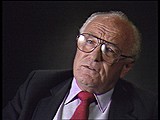
-
Hetty d'Ancona Deleeuwe describes difficulties of going into hiding
Oral HistoryThe Germans invaded the Netherlands in May 1940. After a year or so, Hetty and other Jewish children could no longer attend regular schools. The Germans took over her father's business in 1942. Hetty's father tried to prove that the family was Sephardic, and they were thus exempted from a roundup in 1943. Hetty's father decided that the family should leave Amsterdam, and Hetty was hidden with a family in the southern Netherlands. She and both her parents survived.
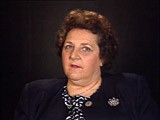
-
Riga
ArticleGerman forces occupied Riga, Latvia in July 1941. Learn more about the establishment of the Riga ghetto, mass shootings of Jews, and Jewish resistance.
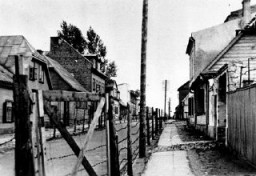
-
Frank Liebermann
ArticleExplore Frank Liebermann’s biography and learn about his experiences of antisemitism in his home town in Germany before World War II.
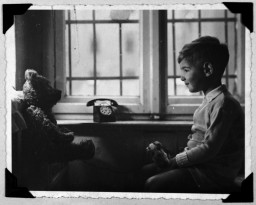
-
Albert Speer sworn in at Nuremberg
FilmDefendant Albert Speer is sworn in at the International Military Tribunal.
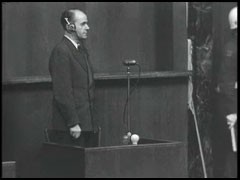
-
Storm Troopers stand guard outside a defaced Jewish-owned business
PhotoShortly after the German annexation of Austria, Nazi Storm Troopers stand guard outside a Jewish-owned business. Graffiti painted on the window states: "You Jewish pig may your hands rot off!" Vienna, Austria, March 1938.
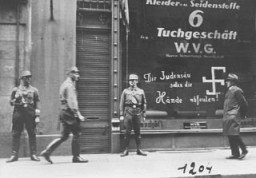
-
Ernst Toller
ArticleErnst Toller was one of the best-known German dramatists of the 1920s. He wrote against Nazism, and was among those whose works were burned under the Nazi regime.
